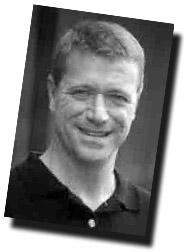Don't Blink, Think, Part 2
An Interview with Michael LeGault, author of Think!March 10, 2008. By Vern Burkhardt
Last week we ended with my question to Michael R. LeGault, author of Think! Why Critical Decisions Can’t Be Made in the Blink of an Eye, regarding fear. We continue this week with his answer to that question and a number of other questions.Vern Burkhardt (VB): You say that the things people fear have not changed, but that people’s awareness of negative things has increased. You observe that while the USA’s Environmental Protection Agency experts did not rank radioactive waste and radiation from nuclear accidents as an environmental health danger, a study by the EPA found that these two things were the biggest environmental fears of the public. Is this an example of the negative effect of sensationalistic journalism? The type that reports the “scare of the moment”, and exaggerates to stimulate our emotions?
 Michael LeGault: Radioactive waste is a health danger of course, but it is not one that experts rank as a high risk to the public. These experts ranked indoor air quality of office buildings as a bigger risk to health than, for instance, highly publicized and feared exposure to chemicals in drinking water and food. It would help if someone would explain the fundamentals of toxicology—dose, frequency and concentration—but you generally won’t find it in any article on environmental exposure to toxins. Everything is toxic to some extent and, visa versa, below a threshold (dose, frequency, concentration) every substance is not toxic. If you drink 8 gallons of water in a short period of time you could die. On the other hand a nanogram of arsenic is not going to harm you.
Michael LeGault: Radioactive waste is a health danger of course, but it is not one that experts rank as a high risk to the public. These experts ranked indoor air quality of office buildings as a bigger risk to health than, for instance, highly publicized and feared exposure to chemicals in drinking water and food. It would help if someone would explain the fundamentals of toxicology—dose, frequency and concentration—but you generally won’t find it in any article on environmental exposure to toxins. Everything is toxic to some extent and, visa versa, below a threshold (dose, frequency, concentration) every substance is not toxic. If you drink 8 gallons of water in a short period of time you could die. On the other hand a nanogram of arsenic is not going to harm you.People’s perceptions are influenced by the media and the media is incapable of reporting or analyzing complex, nuanced issues. I have worked in the media and my feeling is that part of it is deliberate—either they want to scare people to capture attention or, as I believe is the case with global warming, there is something akin to a politically-motivated intent to censor nuance and dissenting views. What’s interesting about the man-induced global warming theory is that it is not proven. In fact it is not even testable. A theory that can’t be tested is not science; it’s conjecture or worse, religion. This is a paraphrase of a famous statement made by the science philosopher Karl Popper.
SOURCE

No comments:
Post a Comment